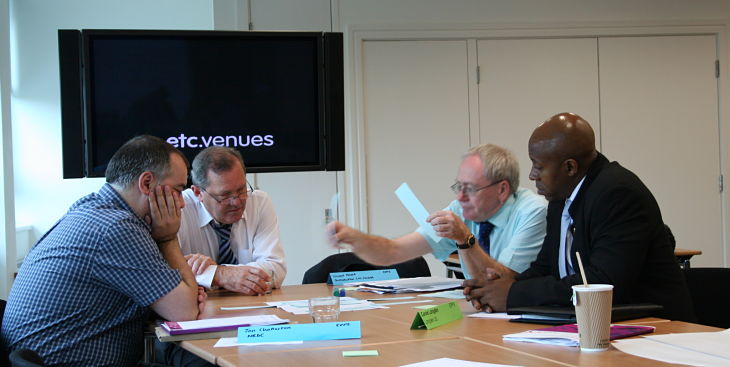Brian Creese of NRDC calls for more careful use of language in public policy discussions about adult literacy.
Oxford English Dictionary: Illiteracy: of persons ignorant of letters or literature, spec. (in reference to census returns, voting by ballot etc.)
Wikipedia: Functional illiteracy is reading and writing skills that are inadequate “to manage daily living and employment tasks that require reading skills beyond a basic level.” Functional illiteracy is contrasted with illiteracy in the strict sense, meaning the inability to read or write simple sentences in any language. Foreigners who cannot read and write in the native language where they live may also be considered functionally illiterate.
The old adage suggests that there are ‘lies, damned lies and statistics’, clearly blaming the numerate for obfuscating the truth. I think this is a calumny; it is plain to me that it is the literate and the way they subvert the meaning of words who cause all the trouble.
Once upon a time we knew what words meant, and if in doubt, we could look them up in the dictionary. But these days words change so rapidly we can have little recourse to books for help. Here at the IOE I am surrounded by potentially explosive words which have deep and subtle nuances: is that deadline challenging rather than impossible? are we teaching, supporting or delivering? dare I have a brain storm in this company? do I mean English and maths (GCSE) or literacy and numeracy (functional skills)?
Michael Gove, in a speech to the British Chambers of Commerce, declared his intention to “eliminate illiteracy and innumeracy in Britain”. In a welcome burst of ambition he went on, “…in the same way as developing nations know they need to secure clean drinking water and eliminate malaria if their children are to flourish.”
So there is no doubting Mr Gove’s ambition. But is this a hard challenge? The thrust from the likes of NRDC has been to work with those with poor or very poor literacy skills. But we have never made illiteracy a prime target, because there really aren’t many illiterate people in the country. There are undoubtedly a few who exist largely off the radar – remote Traveller families perhaps, some immigrants who may be illiterate in their own language. But usual estimates are that way under 1% of the population is illiterate.
So eliminating illiteracy doesn’t look that tricky!
But perhaps Mr Gove is using a different definition of illiteracy? The Leitch Report, one of the fundamental drivers of basic skills policy for the last Labour government, defined something called ‘functional literacy’ as the skill level possessed by those with literacy skills of Level 1 and above (equivalent to GCSE D-G scores). Confusingly, the report defined ‘functional numeracy’ as those with Entry level 3 skills and above (the average 9- to 11-year-old). This is, I think the definition used by the National Literacy Trust, who suggests there are 5.2 million ‘functionally illiterate’ adults in England alone. The trust defines the ‘functionally illiterate’ as those whose skills are “at or below those expected of an 11 year old”. I assume this means those with literacy skills below Level 1.
Meanwhile, Shadow Employment Minister Stephen Timms recently pointed out that “one in 10 jobseekers lack basic skills.” Mr Timms, however, defines ‘basic skills’ as those of people on Entry level 1 or below (the level of a 5- to 7-year-old), a rather lower benchmark than used by Leitch and the charities.
Does any of this matter? I think it does. The term ‘illiterate’ is not neutral and certainly carries with it a series of expectations which could easily stigmatise an individual. The professionals may be happy to use ‘functional illiteracy’ as a label and have a clear understanding of what it means, but label someone illiterate in the real world and the expectation will be that they cannot read or write. Indeed, the formal definition (above) suggests that illiterates are ignorant of letters.
NRDC and other organisations working with those who do indeed have poor literacy skills know well the strategies used by people to ‘get by’ in the real world. Even those at the lowest formal levels can recognise words, and deduce some meanings. To suggest that the average 11-year-old is illiterate is similarly misleading, and rather dismissive of the achievements of that age group. They may struggle to read the Financial Times but this is hardly a meaningful definition of literacy (functional or otherwise). I would suggest that most 11-year-olds function quite adequately and do have reading and writing skills that are adequate to manage their daily living. I’m sure their teachers would never define the average Year 6 child as ‘illiterate’.
So while I clearly welcome Michael Gove’s support and determination to improve the literacy and numeracy skills of the adult population, I really think his use of language was unfortunate and misleading. Please, Mr Gove, pledge to help those adults with poor literacy and numeracy skills as much as you can, but don’t label them illiterate. That is something else altogether.


Leave a comment